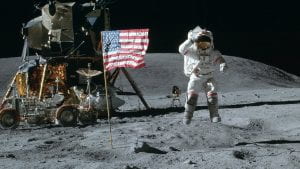December of 1972 was the last time that men stepped foot on the moon. Why have we not gone back since? What’s changed since then? Space exploration was a new phenomenon following the end of World War II. At this time, tensions were high between the United States and the Soviet Union. The nuclear arms race was a competition between the United States and the Soviet Union during the Cold War. As tensions rose, so did the countries’ focus on space exploration. On October 4,1957, Sputnik, a Soviet R-7 international ballistic missile, made history as the first artificial man-made satellite sent into Earth’s orbit(1). When news broke, the United States was surprised and shocked, but not in a good way. The United States became more paranoid because this satellite showed that it was capable of delivering nuclear warheads.
 Sputnik set off the space race
Sputnik set off the space race
By 1958, the US had created and launched Explorer I, which was a satellite, under the direction of Wernher von Braun. Shortly after, President D Eisenhower signed a public order creating the National Aeronautics and Space Administration (NASA). The following year in 1959, the Soviet Union launched another mission, Luna 2, this time making the first man-made object to reach the surface of the moon. For the next few years, both countries took turns sending astronauts to orbit the Earth. From 1961-1966 both countries were relentlessly trying to get their men to step foot on the moon. The United States and the Soviet Union had lost men in attempting to achieve this goal and started to be scolded by the rest of the world asking if space exploration was necessary. Finally on July 16, 1969, Apollo 11 launched with astronauts Neil Armstrong, Edwin “Buzz” Aldrin and Michael Collins. They landed on the moon on July 20, and Niel Armstrong became the first man to walk on the moon, famously stating that this experience was “one small step for man, one giant leap for mankind.” The Soviets attempted to land on the moon four times but ultimately failed.
Three years later Apollo 17 became the last expedition to land on the moon. Many speculate that after “winning” the space race, enthusiasm began to drop and the focus shifted to the Vietnam War(2). Some argue that the reason we haven’t visited recently is because we do not have to. In other words, the United States and the Soviets were racing to get to the moon but since we have gone, there is nothing more to see. Going to the moon no longer excites the public as before so funding NASA is a tough sell. During the Cold War, stakes couldn’t have been higher, and it was the ultimate bragging rights and demonstration of superiority that both countries were striving to achieve. Now NASA is focusing on “bigger fish” by visiting planets like Mars(2). When asked by Vice President Pence when they would be ready to go back to the moon, NASA responded with “2028.” For the time being, NASA is spending their resources on finding planets that could support human life and by visiting other planets within our solar system. It is safe to say that NASA does not have any serious plan to visit the moon at the moment.
Works Cited
History.com Editors. “The Space Race.” History.com, A&E Television Networks, 22 Feb. 2010, www.history.com/topics/cold-war/space-race.
Howell, Elizabeth. “Apollo 17: The Last Men on the Moon.” Space.com, Space, 3 Oct. 2018, www.space.com/17287-apollo-17-last-moon-landing.html.


It is really interesting to think that soon we will be back to the moon and hopefully beyond that. I also never realized how big of an effect that the space race was tied into the public’s mind during the cold war and ultimately the end of massive funding for NASA also fell around the same time that the USSR did as it seemed to be less important now to congress. I am also curious to see how the recent Chinese mission to the moon impacts U.S. spending on space programs. Furthermore, I am sure the Colombia tragedy also ice over an already cold shoulder towards the evermore expensive space programs.